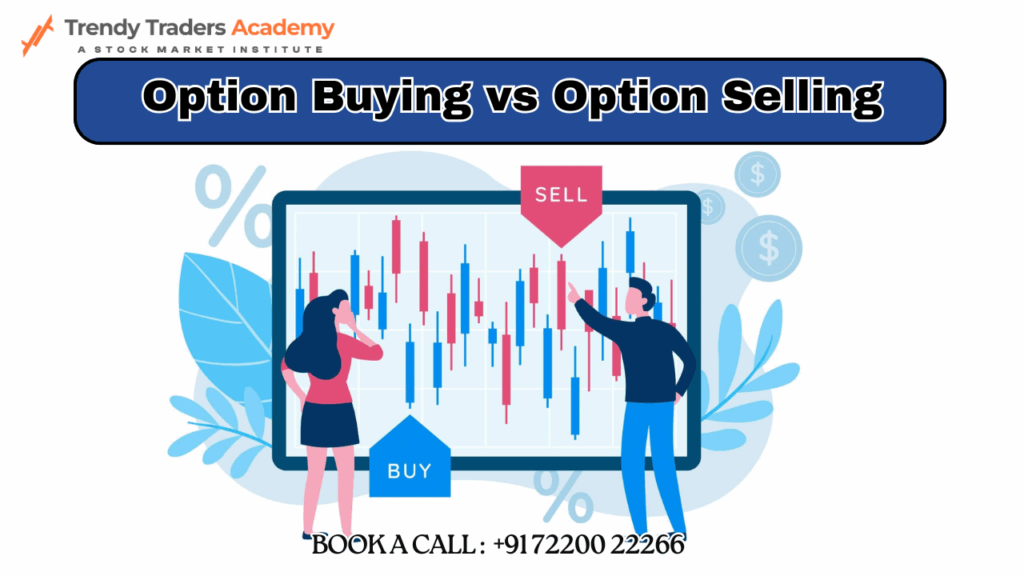Option Buying vs Option Selling: Which One Should You Choose?
Introduction
Let’s say you’ve just stepped into the world of options trading. Exciting, right? But here comes the big question: Should you be buying options or selling them? It’s like choosing between being a batsman or a bowler in cricket—both play the game, but in very different ways.
In this article, we’ll break down option buying vs option selling using simple language and real-life comparisons. Whether you’re just starting or trying to refine your strategy, this guide will help you see which side of the options world suits you better. And don’t worry, we’ll keep it conversational, relatable, and packed with practical insights—just like the best stock market trainer in India would explain it to you.
Explore the difference between OPTIONS SELLING and buying. Learn from the best stock market trainer in India and the best teacher in trading.
What Are Options? A Quick Refresher
Options are like a contract that gives you a choice (not an obligation) to buy or sell something—usually a stock—at a set price, within a set time.
There are two main types:
Call Option: Gives the right to buy.
Put Option: Gives the right to sell.
But here’s the twist—someone is buying the option, and someone else is selling it.
The Players: Who Buys, Who Sells?
Think of the options market as a game with two key players:
Buyers: Pay a small fee (premium) hoping for big gains.
Sellers: Take that fee and hope the buyer never makes a move.
It’s like someone buying a movie ticket hoping for an epic show, while the seller (theater owner) makes money no matter what—even if the movie flops.
Option Buying Explained in Simple Terms
When you buy an option, you’re betting on a big move in the stock price. You pay a premium for the right to act later.
For example:
You buy a Call Option for Stock X at ₹100, paying a ₹5 premium. If the stock rises to ₹120, you profit after subtracting the premium. If it doesn’t rise, you lose just the premium.
Pros:
Limited loss (just the premium)
Unlimited profit potential
Cons:
High probability of loss due to time decay
Requires accurate prediction in direction and timing
Option Selling Demystified
When you sell an option, you’re on the opposite side. You collect the premium and hope the option expires worthless.
Example:
You sell a Call Option for ₹5. If the stock stays below the strike price, you keep the premium. If it rises, you may have to cover it, possibly with a loss.
Pros:
High probability of profit
Premium is received upfront
Cons:
Loss can be unlimited (especially in naked calls)
Requires margin and more capital
No wonder OPTIONS SELLING is considered a skill taught only by the best teacher in trading.
Profit Potential: Who Makes More Money?
Here’s where it gets interesting.
Buyers have a lottery ticket—small investment, huge potential gain.
Sellers are like the lottery company—many small wins, occasional big loss.
Statistically, sellers make money more consistently. But when buyers win, they can win big.
Risk Factor: Where’s the Danger?
Let’s compare:
Option Buyers: Maximum loss is the premium paid.
Option Sellers: Can face unlimited loss if not hedged properly.
So, option selling needs strict risk management—something the best stock market trainer in India will always emphasize.
Capital Requirement: Who Needs More Money?
Buyers: Can start with just a few thousand rupees.
Sellers: Need more capital due to margin requirements.
Option selling isn’t ideal for those with low capital unless strategies like spreads or hedging are used.
Time Decay: The Silent Killer
Here’s something many beginners overlook—Time Decay.
Each day, options lose value due to time.
This works against buyers and for sellers.
Sellers literally earn from the passing of time. It’s like renting out your car and earning daily—even if no one drives it.
Real-Life Analogy: Renting a House
Let’s say you own a house (like an option seller). You rent it out (collect premium) hoping nothing bad happens. Over time, you keep earning rent.
Now imagine being the tenant (option buyer). You pay rent upfront. If you don’t make the most of the house (stock price movement), your money is gone.
Option Selling = Landlord.
Option Buying = Tenant.
This analogy makes it easier to understand who usually wins!
Who Should Buy Options?
You should consider buying options if:
You have limited capital
You expect a sharp move in the stock
You are okay with the possibility of total loss (of premium)
It’s perfect for short-term bets with a big reward, just like placing a smart gamble.
Who Should Sell Options?
You might be ready for OPTIONS SELLING if:
You have more capital
You prefer consistent small profits
You understand market trends and risk management
Learning it from the best stock market trainer in India makes a world of difference.
Psychology Behind the Trade
Option buyers often deal with emotional swings—hoping and waiting for the big move.
Sellers need to stay disciplined, calm, and avoid greed. It’s like driving a truck—you must control speed, weight, and road conditions.
Discipline > Intelligence in options selling.
Learning from the Best Teacher in Trading
Not all strategies are created equal, and neither are teachers.
When you learn from the best teacher in trading, you get insights on:
Hedging techniques
Understanding volatility
Risk control
Real-life strategies that work
The right mentor will show you how OPTIONS SELLING can be a consistent income source—if done right.
Common Mistakes to Avoid
Here are some classic errors:
Option Buyers:
Holding till expiry hoping for a miracle
Ignoring time decay
Option Sellers:
Selling without hedge
Getting greedy for higher premium
Avoiding these mistakes is the first lesson taught by the best teacher in trading.
Conclusion: Choosing Your Side
So, option buying vs option selling—what’s better?
It depends on YOU.
Want low-risk, high-reward bets? Try buying.
Want consistent, low-risk income? Learn selling.
But remember, OPTIONS SELLING is not for the faint-hearted. It requires knowledge, capital, and guidance—preferably from the best stock market trainer in India.
Both paths are valid. Your choice should match your personality, risk tolerance, and financial goals.
FAQs
Is options selling better than buying?
Yes, in terms of probability of profit, options selling is better. But it carries higher risk and needs proper knowledge and capital.
Can I start options trading with ₹5000?
Yes, but mostly for buying options. Selling requires more capital due to margin needs.
Why do most option buyers lose money?
Because of time decay and incorrect market timing. Most options expire worthless.
Who is the best teacher in trading for options selling?
Look for trainers with live trading experience, strong risk management focus, and verified student success—often known as the best stock market trainer in India.
Can I earn a regular income from option selling?
Yes, with discipline, strategy, and proper risk control, options selling can provide consistent income over time.





